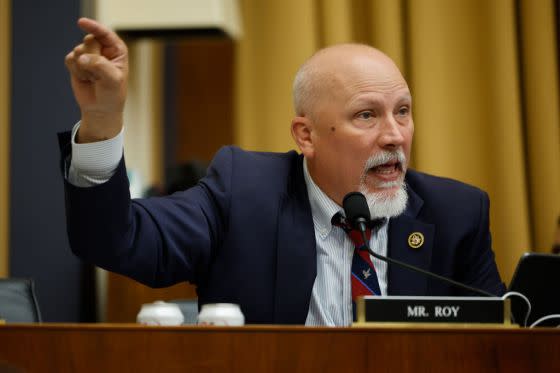
A fiscal showdown in Washington that nearly triggered a government shutdown just days before Christmas demonstrated both the power and limits of President-elect Donald Trump’s threats to oust congressional Republicans who rebuff his directives.
Encouraged by billionaire backer and close confidant Elon Musk, Trump—48 hours before the federal government would have run out of money and shut down—blew up bipartisan legislation to fund the government through mid-March that House Speaker Mike Johnson had painstakingly negotiated for weeks with Democratic and Republican leaders in Congress. The president-elect warned that “Any Republican that would be so stupid as to [support Johnson’s bill] should, and will, be Primaried.” Trump additionally demanded that House Republicans include a two-year debt ceiling hike in any revised bill.
Johnson complied, putting on the floor for a vote a scaled-back package that included Trump’s proposal to raise the federal borrowing limit for two years. Stunningly, the legislation attracted the support of 174 House Republicans, despite there possibly being no floor vote they have struggled with more over the years than one to raise that limit—even when accompanied by spending cuts and fiscal reforms. The episode was a remarkable manifestation of Trump’s influence over the GOP.
Advertisement
Advertisement
But as this political melodrama also revealed, there are limits to the political pull the president-elect has with members of his party.
The amended government funding bill submitted by Johnson ultimately failed because 38 House Republicans ignored Trump’s ominous primary threats and refused to vote for it. When Congress finally passed legislation, averting a shutdown at the eleventh hour, the package was less bloated than the bill agreed upon by the speaker and congressional leaders before the intervention by Musk and Trump. But the law enacted by President Joe Biden to keep the lights on in Washington for another three months did not include the debt ceiling hike his successor had so aggressively insisted on.
“I’m skeptical of the influence that a bunch of threats, largely made on social media, are going to have,” a veteran Republican strategist told The Dispatch, requesting anonymity to criticize Trump’s tactics. “The real question is whether or not President Trump is going to approach governing from the place of actually making deals. If so, I think he can get a lot accomplished, particularly on immigration and economic policy.”
Rep. Rich McCormick seemed to echo that sentiment in an interview with CBS News prior to voting against the revised spending package endorsed by Trump that would have raised the federal borrowing threshold. “We all represent different people and different portions of society,” said the Georgia Republican, who is considered an ally of the president-elect. “I represent 760,000 people that sent me up here to get accountability of the government. If you want to lift the debt ceiling, give me something conservative back.”
Advertisement
Advertisement
Added Rep. Claudia Tenney, a New York Republican: “Trump can sit on Truth Social all day, that didn’t persuade 38 members of Congress.” The response was much the same from Rep. Chip Roy, against whom the president-elect explicitly threatened to recruit a primary challenger after the Texas Republican refused to support the legislation with the two-year debt hike. “Thirty-eight Republicans stood up and said: ‘This wasn’t good enough,’” Roy told NewsNation.
Trump emerged from the November election as the undisputed leader of the Republican Party. Yet the pre-Christmas spending fight in the House suggests that congressional Republicans are only willing to be bullied so much. Even under threat of Trump-backed primary challengers in ruby red districts, certain issues are (apparently) a matter of principle.
That has implications for how ideologically flexible, or pragmatic, House and Senate Republicans are willing to be on a range of Trump’s legislative priorities. Those include legislation to secure the U.S.-Mexico border, cut taxes on individuals and corporations, slash spending for some government programs while raising it for others, reduce federal regulations, and repeal some laws signed by Biden that have proven popular.
To sidestep Democratic opposition, Trump and congressional Republicans are planning to pack as much as possible into a “budget reconciliation” package—perhaps two—since it can’t be filibustered in the Senate. The GOP is poised to assume the Senate majority on January 3 but at 53 seats will be seven short of the 60 required to quash the filibuster the minority can use to stall standard legislation.
Advertisement
Advertisement
More in Politics
Yet Republicans will still have to agree among themselves, a tall order for the party generally and one made more difficult by the fact that the GOP majority in the House will rest on less than a handful of seats—at best. Accordingly, say Republican insiders, Trump’s ability to discipline Republicans on Capitol Hill with threats to mount primary challenges against lawmakers who stiff-arm his demands (and Musk’s) will depend on how effectively he can rally GOP voters to his cause.
“I don’t think it’s as much of a problem that he might threaten a primary as that voters might find it a persuadable argument. His pressure only works if voters respond to it,” said a Republican operative who advises members of Congress. And it just might, at least in some instances, he said. “The party has been at various stages of civil war in primaries for 14 years. What is more acute now is that primary voters have decided that the stakes are really high and that if Trump faces internal dissent, it’s a problem.”
This dynamic, bolstered by a network of Trump-aligned political groups and media figures, could particularly play to Trump’s advantage in the Senate.
Roughly one-third of the 100-member body is up for reelection in 2026. That includes approximately 20 Republicans who, for the most part, hail from red states that voted overwhelmingly for the president-elect this past November. Trump might face some resistance from Sens. Susan Collins of Maine (a blue state) and Thom Tillis of North Carolina (a swing state). But the rest of the GOP’s incumbent roster will have to look over their shoulders, in part because it’s often easier for Trump to focus attention on Senate races and mobilize voters to oppose his adversaries in the chamber, than it is to do the same in House contests. Just ask Sen. Bill Cassidy of Louisiana, an occasional Trump critic who already has a primary challenger.
Advertisement
Advertisement
“They’re all Trump’s servants,” a Republican lobbyist said, describing just how effective he expects the president-elect’s primary threats to function as a tool to keep GOP senators from opposing his agenda.
EMEA Tribune is not involved in this news article, it is taken from our partners and or from the News Agencies. Copyright and Credit go to the News Agencies, email news@emeatribune.com Follow our WhatsApp verified Channel




